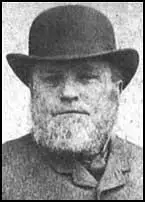Joseph Arch

Joseph Arch, the son of a farm labourer, was born at Barford, Warwickshire, on 10th November, 1826. After attending school for three years Joseph started work at the age of nine as a bird scarer on a local farm. Over the next few years he developed the skills of hedging, ditching and mowing.
On 3rd February, 1847, Arch married Mary Anne Mills, the daughter of a carpenter. A year later Arch became a Primitive Methodist lay preacher. In many of his sermons he dealt with the financial problems of farm labourers. He developed a reputation as a radical and in 1872 he was approached by a group of men who sought his help in forming a farm workers' union. Arch agreed to their request and during the next few months members increased rapidly. On 29th May, 1872, the National Agricultural Labourers' Union was established and Joseph Arch was elected as its full-time President. Within two years the union had over 86,000 members, over one-tenth of the farm work force in Britain.
The Canadian government invited Joseph Arch to visit its country in 1873 where he examined the suitability of the country for British emigration. Arch was impressed with what he saw and during the next few years the union helped over 40,000 farm labourers and their families to emigrate to Canada and Australia.
As well as trying to improve his members' pay and conditions, Arch also campaigned for the extension of the franchise. William Gladstone, the leader of the Liberal Government, was sympathetic to these demands and this resulted in the passing of he 1884 Parliamentary Reform Act.
In the 1885 General Election, Joseph Arch was elected as the Liberal Party MP for North-West Norfolk. Arch, the first agricultural labourer to be a member of the House of Commons. In 1893 Arch was appointed as a member of the Royal Commission on the Aged Poor.
Joseph Arch retired from Parliament before the 1900 General Election. He retired to Barford where he lived until his death on 26th March, 1922.
Primary Sources
(1) Henry Snell, Men Movements and Myself (1936)
Another abiding memory concerns the tireless industry of these agricultural workers. I doubt whether men and women ever worked harder, and I do not believe that necessary and honourable toil was ever more inadequately rewarded. They had no recreation beyond a perhaps weekly and half-ashamed visit to the public house, or an occasional social event at one of the local chapels.
If the position of the agricultural labourer today is an improvement upon the prevailing fifty years ago, it is in no small degree due to the organization started by Joseph Arch. The farm labourer today enjoys the full rights of British citizenship; he can take part in the local or national government of his country; he is, in so far as he is organised, a part of the labour movement; his social status has been raised; he is entitled to receive compensation for accidents; he has the consoling assurance of the old-age pension; he enjoys some little improvement in housing and sanitation, medical treatment, and sick pay for himself, though not for his wife and children.
